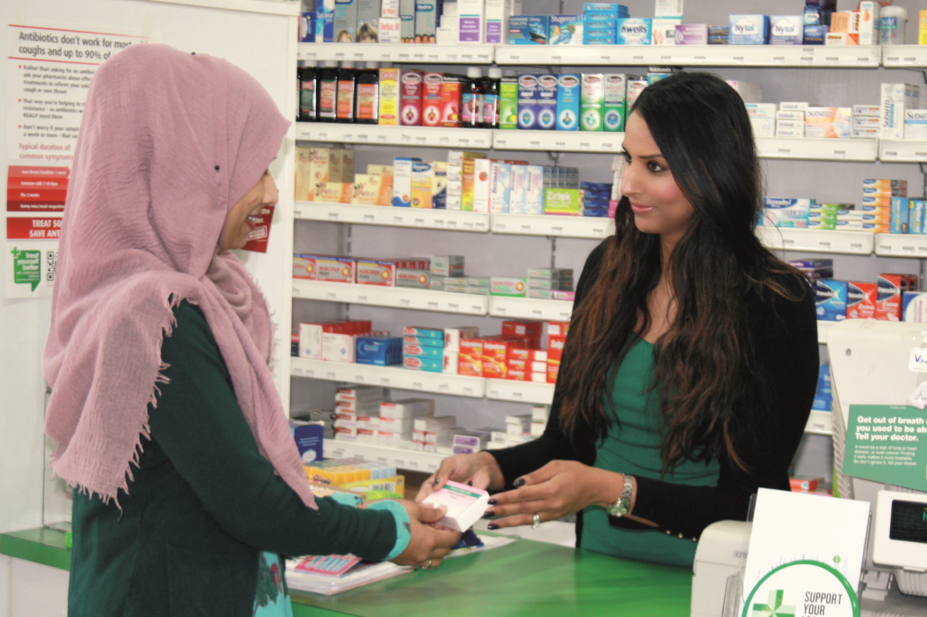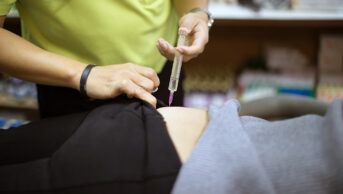
Greenlight Pharmacy, Euston, courtesy of Nadia Bukhari
The UK prides itself on its rich and diverse population, within which many religious and personal beliefs are observed. Many of these beliefs may be associated with dietary restrictions, so it is important to consider religious or personal beliefs when prescribing and dispensing medicines for patients.
Islam: eating and drinking
Islam is the second most-practised religion in the UK, and makes up 4.4% of the total population1. In Islam, prohibitions are specified either by a verse of the Qur’an (holy scriptures) or authentic and explicit Sunnah (teachings) of the last Prophet Muhammad (peace be upon him), which form the Islamic Law (Shariah).
“Therefore eat of that on which Allah’s name has been mentioned if you are believers in His verses.” (Qur’an 6:118).
These laws give Muslims the freedom to eat and drink all food and drinks that are not prohibited (haram)2; however, it should never be assumed that every individual is compliant with all the practices within Islam, so healthcare professionals are advised to consult with each patient as an individual and ascertain their views and beliefs before a treatment plan is put in place.
The meaning of halal, haram, mushbooh and tayyib
Halal means lawful or legal. Halal ingredients are vegetables, plants, fish, meat, fat or gelatin from a halal animal (which was slaughtered according to Shariah rules).
Haram is the opposite of halal. Examples include foods, constituents and pharmaceuticals that contain pork, alcohol, and animals not slaughtered in the Shariah way3.
In Arabic, mushbooh means ‘doubtful things’. Constituents, food and pharmaceuticals that are mushbooh have been classed as neither halal nor haram, but Muslims are advised to stay away from them. Individuals should seek advice from their religious scholars if there no other options are available; personal situations and circumstances may vary.
Tayyib refers to a particular good or product that is clean, pure and produced using standard processes and procedures. A pharmaceutical product should not only be Halal, but also deemed clean and quality assured according to Shariah law. This is also expected for pharmaceuticals under the UK licensing law.
Pharmaceutical constituents that are halal or haram
Pharmaceutical products that contain ingredients permitted under the Shariah law, and fulfil the following conditions, are considered halal (permissible)4,5:
- The product does not contain any parts or products of animals that are non-halal, or any parts or products of animals that are not slaughtered according to Shariah law;
- The product is safe for consumption, non-poisonous, non-intoxicating and non-hazardous to health according to prescribed dosage.
Emergency situations
It is important to note that in life-threatening situations, haram products can become halal. The Shariah is very flexible, and non-halal medication can be given if there is no viable alternative and if the patient’s life depends on it, or if the patient would suffer significant morbidity by not taking the medication.
| Advanced search term | Product listed | eMedicines Compendium section | Relevant information |
|---|---|---|---|
| Porcine | Creon 40,000 capsules | 5.1 Pharmacodynamic properties | Contains porcine pancreatin formulated as enteric-coated (acid-resistant) mini-microspheres within gelatin capsules |
| Curosurf | 2. Qualitative and quantitative composition | One 1.5 ml vial contains 120mg of phospholipid fraction from porcine lung (poractant alfa) | |
| Defitelio 80mg/ml solution for infusion | 2. Qualitative and quantitative composition | Produced from porcine intestinal mucosa | |
| Fluenz Tetra nasal spray | 6. List of excipients | Gelatin (porcine, type A) | |
| Fragmin 5,000 IU | 5.1 Pharmacodynamic properties | Produced from porcine-derived heparin sodium | |
| Hypurin porcine | Active ingredients | Insulin, porcine insulin, pork insulin | |
| Pancrease HL | 5.1 Pharmacodynamic properties | Porcine-derived pancreatic enzymes (lipases, proteases, and amylases) | |
| Pancrex | 5.1 Pharmacodynamic properties | Porcine-derived pancreatic enzymes (lipases, proteases, and amylases | |
| Pork | Hypurin Porcine 30/70 mix cartridges | Active ingredients | Insulin, porcine insulin, pork insulin |
| Bovine | Hypurin bovine isophane cartridges | Active ingredients | Beef insulin, bovine insulin, insulin. |
| InductOs (dibotermin alfa) | 6.1 List of excipients | Bovine type I collagen | |
| NovoSeven | 4.4 Special warnings and precautions for use | May contain trace amounts of mouse IgG, bovine IgG and other residual culture proteins (hamster and bovine serum proteins) | |
| Alcohol | Codeine phosphate syrup | 2. Qualitative and quantitative composition | Each 5ml of syrup contains 2.1 vol% of ethanol (alcohol) |
| Daktarin oral gel | 4.4 Special warnings and precautions for use | This medicinal product contains small amounts of ethanol (alcohol), less than 100mg per dose | |
| Ethanol | Diazepam 5mg/ml solution for injection | 2. Qualitative and quantitative composition | Ethanol 96% 100mg/ml |
| Amitriptyline hydrochloride 25mg/5ml and 50mg/5ml oral solution | 2. Qualitative and quantitative composition | Approximately 10.5mg ethanol in 5mL of solution | |
| Co-trimoxazole for infusion 16 mg/80mg per ml | 2. Qualitative and quantitative composition | 13.2 vol% ethanol (alcohol) per 5 ml | |
| Priadel liquid | 2. Qualitative and quantitative composition | 211mg of ethanol 96% per 5ml solution |
Further information
Patients who are unsure whether a particular medicinal product is halal or haram should seek advice from their local imam. Local imams can also offer advice to healthcare professionals.
Medicines information services can be useful when investigating whether products available in the UK are suitable for Muslim patients, and the services can also suggest alternative options.
The Muslim Council of Britain can also answer specific enquiries or concerns from patients or healthcare professionals. Find out more at: http://www.mcb.org.uk/
References
- Office for National Statistics. 2011 Census. Available at: https://www.ons.gov.uk/census/2011census (accessed April 2018)
- Sarriff A & Abdul-Razzaq HA. Exploring the halal status of cardiovascular, endocrine, and respiratory group of medications. Malays J Med Sci 2013;20(1):69–75. PMID: 23785257
- Selamat Datang Ke Portal Rasmi MyHEALTH, Kementerian Kesihatan Malaysia. Halal and haram medicines (Islamic perspective). Available at: http://www.myhealth.gov.my/en/halal-haram-medicines-islamic-perspective/ (accessed April 2018)
- National Pharmaceutical Control Bureau. Ministry of Health, Malaysia. Halal pharmaceuticals: a regulator’s perspective. Available at: http://npra.moh.gov.my/images/Announcement/2013/Slides-for-National-Regulatory-Conference2013/Plenary_09-_Halal_Pharmaceuticals.pdf (accessed April 2018)
- Halim MAA, Salleh MMM, Kashim MIAM et al. Halal pharmaceuticals: legal, Shari’ah issues and fatwa of drug, gelatine and alcohol. Int J Asian Soc Sci 2014;4(12):1176–1190
- Specialist Pharmacy Service. What factors to consider when advising on medicines suitable for a Halal diet? Available at: https://www.sps.nhs.uk/articles/how-can-i-find-out-if-medicines-may-be-considered-okoshero-or-ohalalo/ (accessed April 2018)
Nadia Bukhari is senior teaching fellow in pharmacy practice, UCL School of Pharmacy.


